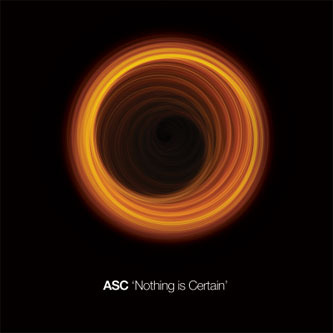Drum’n’bass music sometimes seems like the pariah of electronic music; once the pinnacle of musical futurism, its current incarnation is often viewed as a sterile, overly masculine template with little room for growth or development beyond its narrow confines. Maybe there’s truth to this, though generalizations are never a good thing. Either way, there are a few producers who are intent on revitalizing dnb, and whether or not they make a deliberate and conscious mission out of it, it would be ignorant to say they weren’t succeeding. The ‘Autonomic’ sound championed by Instra:mental, dBridge, and ASC (among many others) is an expansive world of inter-genre crossbreeding rooted in drum’n’bass, and Instra:mental’s label NonPlus+ has quickly skyrocketed to its current status as one of the most respected labels in bass music. The label is finally releasing its first album, Nothing Is Certain, by ASC: it’s a statement that’s not only aggressively experimental but also daringly drum-n-bass — probably the most ‘traditionally’ drum-n-bass release the label has had so far, making a case for the music right when they’ve finally got the listener right where they want them.
Of course, notions of tradition here are relative; the tracks on Nothing Is Certain are some of the most open and experimental dnb to be heard in years. They are typical only in tempo, but even when the tracks are at conventional tempos, they sound anything but; the music is rather like perfectly conceived nu-industrial, an industrial music that focuses on mechanism and precision rather than hackneyed ideas about materialist society and mass manufacturing processes. If there’s anything critical to be said about James Clements, it’s that his music in the past could sometimes sound too austere, trying too hard to be pretty to the point where there was no discernible emotion beyond the delicately-painted facade. There are moments on Nothing Is Certain that come dangerously close to this, but even when they do, they’re holding out, waiting for you to insert your emotions — these tracks are open to intense personalization and internal compartmentalization and become all the more meaningful in the process.
Austerity is as much of a concern as ever on ASC’s fourth album; opener “Midnight” is a survey of some antiseptic lab, complete with faint images of faceless people in white smocks. The key is his mixture of ultra-clean percussion and the same icy, indefinable synths and pads that are so prevalent in the Autonomic sound: despite their omnipresence, they never feel predictable or overused. Instead, each melancholic note grabs by the throat, touching on some subconscious nostalgia, devastating in its subtlety, as if losing their voice and power long ago to some unseen force. Instead of merely giving into depressive tendencies, this is Clements’ way of baring the human heart at the centre of his productions — you can hear it beating in the hesitant bassline of “Midnight,” lubricating the slippery jackhammer of “Matter of Time,” and most obviously in the aching vocals that pepper the album. Where he’s used vocals in the past to mainly predictable aesthetic affect, here they seem to spring out of some deep-seated well, a completely natural extension of the otherwise artificial mechanical beats (the hooky and liquid snippets on “Lost For Words” or the titular phrases on “Losing You” for example). In these details lie the true genius that ASC unfolds over Nothing Is Certain; the imperfections are imperceptible but if you can invest yourself deeply enough to try to look for them, you’ll be endlessly rewarded with a torrent of stirring evocations.
In discussing the album with colleagues, one of the most common concerns is the album’s supposed politeness or even reservation, and it’s true that Nothing Is Certain is an album that lives solely in its own world, content to refrain from reaching outside. You have to let it grab you, it’s not going to do all the work. That said, you’d be foolish to dismiss an album as monumental and affecting as Nothing Is Certain out of sheer laziness. However insular it might appear, it isn’t afraid to break boundaries, as over its duration the ASC sound is deconstructed to the point where at times it barely sounds like drum-n-bass anymore; the ultra-detailed “Ubiquity Incident” especially sounds like true ‘future music,’ separated far from the self-aware futurism of so many of his contemporaries. Perhaps the best way I can describe his music is that it’s sufficiently detailed, emotive and ambient (I cringe to think about how many layers of sound there truly are in these tunes) in order to function as proper film music, but that would be a waste of its intrinsic beauty and its sheer potential to move you. The sound is complex and so self-contained that even the two collaborations (with Vaccine and Consequence) barely allow any of their co-producer’s qualities to shine through the opaque textures of his beats. Really, it just boils down to patience and vulnerability: if the slow, decaying breakdown in “Yatta” doesn’t get to you with its multifaceted string and synth motifs, well… The rest of us can revel in some of the most beautiful and experimental music of the year. ASC doesn’t push the envelope, he burns it — you can hear the flames burning steadily in these beats.

